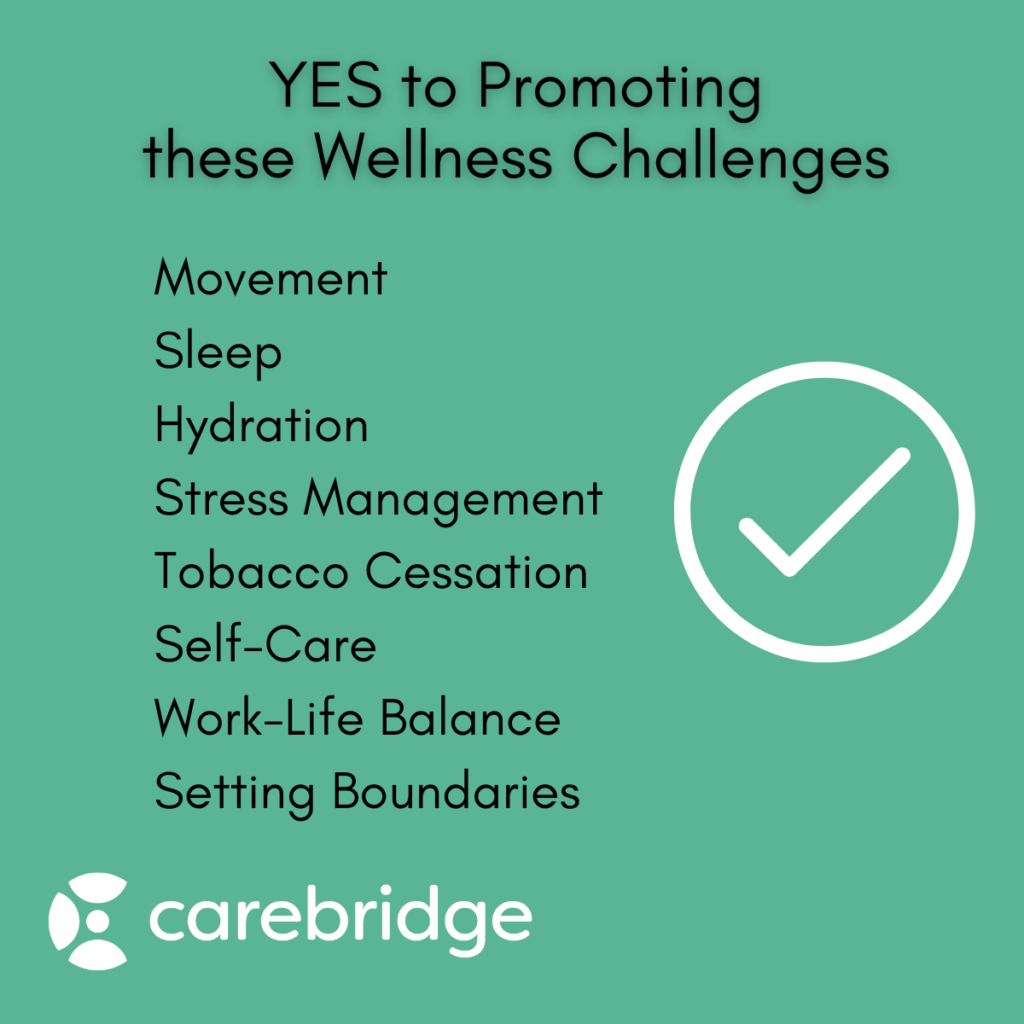Eating Disorder Informed Wellness Programs
Do you have an eating disorder informed wellness program that’s inclusive of employees of all sizes and abilities? Or is your organization potentially using insensitive programming that focuses on weight loss instead of healthy behaviors? Keep reading to evaluate your current wellness challenges through these 4 questions.
The health and wellbeing of your employees is important. Promoting behavioral change for better physical health and mental health has a positive impact on the whole organization. But sometimes wellness programs can be mistaken for weight-focused programming, which can be harmful. Especially for individuals who have a history of an eating disorder.
Create an eating disorder informed wellness program by considering the following questions:
1. Is your programming promoting behavioral change or appearance change?
Weight is not a behavior. And a straight-sized body is not an automatic indicator of good health. Changing one’s appearance (e.g. weight loss or inches loss) is not a health-based goal. Company-wide wellness initiatives should focus on improving health—not lowering weight. A person’s health includes:
- Physical Health
- Organ function
- Energy levels
- Digestion
- Sleep paterns
- Hydration
- Balance, flexibility, stamina, and strength
- Mental Health & Emotional Health
- Stress management & coping skills
- Work-life balance
- Empathy & compassion
- Social Health (SDOH)
- Economic stability
- Education access and quality
- Healthcare access and quality
- Neighborhood and built environment
All of these health factors are not related to weight.
Only 6% of those diagnosed with an eating disorder are underweight. In fact, eating disorders can happen to anyone of any size, gender, race, age, or sexual identity.
2. Is your wellness programming using inclusive language or is it perpetuating diet culture?
Diet culture is any approach to eating or exercise that uses specific rules to achieve appearance-based goals (weight, fat, or inches loss; muscles gained). While chronic dieting (often called yo-yo dieting) has been normalized by our society, language around weight loss can be triggering to those with a history of disordered eating.
However, when wellness promotions and challenges are viewed through the lens of inclusivity and positive behavioral change, they become accessible to all employees.
YES to Promoting these Eating Disorder Informed Wellness Challenges:
- Movement
- Sleep
- Hydration
- Stress Management
- Tobacco Cessation
- Self-Care
- Work-Life Balance
- Setting Boundaries

NO to Promoting these Weight-Based Challenges:
- Weight loss
- Fat loss
- Inches or pant size loss
- Low calorie or specific diet plans (e.g. Keto, Paleo, Whole30, etc.)
- Food tracking apps
Know the Facts About Weight
- DEIA includes all body sizes.
- Social Determinants of Health (SDOH) impacts weight, health risks, and outcomes.
- Some people are genetically preconditioned to have smaller or larger bodies regardless of what they eat or how much they exercise.
- Not all weight loss is good weight loss. Someone could be losing weight due to illness, medication, treatment, etc.
- The diet industry was valued at $72.6 billion in 2022.
3. Could your wellness programming be triggering to those with—or who are recovering from—an eating disorder?
Eating disorders come in a number of different forms including Anorexia Nervosa, Bulimia, Orthorexia, ARFID, and Binge Eating Disorders. Employees with any of these disorders often struggle with low self-esteem, shame over their eating behaviors, and hatred of their bodies.
So in order to promote an eating disorder-informed workplace, reconsider how typical wellness challenges and activities impact others. For example:
| Activity | Intention | Implication | The Truth |
| Before/After Photos | Congratulations on losing weight! | Your body is better and more valuable now that it’s thinner. | All bodies are valuable. |
| Weight loss Challenge | Let’s motivate each other to lose weight together! | Something is wrong with you and your body, so you should lose weight. | Weight is not an indication of health. |
| Food Log Challenge | Accountability and a reward will keep you on track! | If you can’t complete this, you lack willpower and motivation. | 35% of dieting becomes obsessive, and 20-25% of those diets turn into eating disorders (NEDA) |
4. Are there other areas within your workplace that aren’t eating disorder informed?
Wellness programming isn’t the only aspect where fatphobia and diet mentality exist. Consider the following within your organization:
Your office environment
Work spaces should include furniture that supports larger bodies, wide hallways, easy-to-access parking, elevator or escalator between floors, and enough personal space to accommodate all sizes.
Food-centered work events
- Consider how food is spoken about. Such as, refraining from saying things like “I’m being so bad today!” Or, “Let’s be good and order salads.”
- Offer a wide variety of foods. Not only will this provide options, but will also benefit those who have food allergies or belief-based preferences (e.g. vegan.)
- Make these events optional or more “open-house” style. For example, buffet-style lines can be overwhelming for those in recovery.
Mental health benefits
Eating disorders are complex. And can be a lifelong journey of up-and-down recovery for some. Employees should have easy access to your organization’s employee assistance program for in-the-moment support, mental health counseling, and life coaching at no-cost to them.
Update Your Employee Wellness Program
So, do you have an eating disorder informed wellness program? Where can you and your HR/Benefits Team make positive changes that will be more inclusive? It may seem like a lot of work, but an informed wellness program increases the likelihood of a healthier workforce, lower healthcare costs, employee retention, and employee engagement. Good luck, we know you can do it!
An eating disorder informed workplace is just one facet of a mentally healthy workforce. To partner with a comprehensive EAP that can help you implement these inclusive wellness ideas and more, email us at sales@carebridge.com.